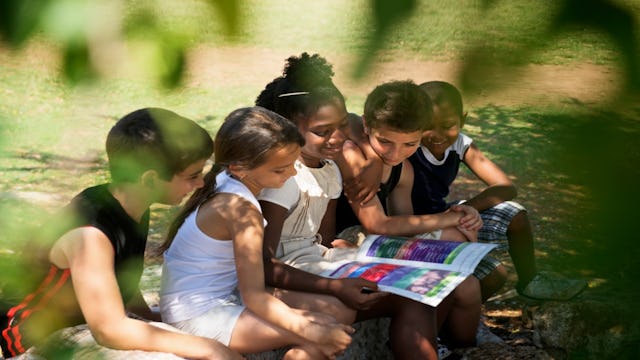Summer Camps Are Leaving Poor Kids Behind

I rarely went to summer camp when I was growing up. Occasionally my parents would put me in a program through the local park district for a couple of days, but for the most part, I hung out at home or at my grandparent’s house finding things to keep me busy. When I look back, I always think about how simple times were and how my folks weren’t as stressed out as many of us parents are today.
Times have changed a lot since those days of my friends and me running around the neighborhood during summer break until the sun began to set. Our parents didn’t wonder what we were doing. As long as we were home when we were supposed to be, everything was fine. Now, we schedule our children’s summers from the day they get out of school until they go back, with a week or two break from camp for a family vacation.
At least, that’s what it looks like for those who can afford it.
There are many families who can’t send their children to camp because the prices have gotten ridiculous. If you don’t have a lot of extra income, or you are underemployed or underpaid, summer camp options are incredibly limited.
I worked in administration for summer programs for years. I understand that it takes a lot to run a good camp. You need to be able to pay for qualified instructors or counselors. If food is included, you have to be able to cover that. There are licenses and other administrative costs that registration fees as well.
Even still, I’ve seen some week-long camps that cost nearly as much as my daughter’s school tuition for an entire month, even though the camp day for most of those programs start at 9 a.m. and end at 3 p.m. So, if you’re a working parent who gets paid hourly, or you’re a single mom, or you don’t have the money to pay for additional childcare to cover the time that camp ends to when you get off of work, your kid can’t go to that camp.
You know what that means, right? The kids who get to learn coding over the summer, or practice sports and the fine arts, come back to school way ahead of students whose parents couldn’t afford those same experiences. And so it begins, the great class divide.
Kids from low-income families have to work twice as hard to try to catch up, and in some cases, they never do. Summer learning loss happens when children don’t have an outlet to continue to learn during the school break. Low-income families are the most affected by the summer slide. With camps becoming more and more expensive, the kids who need enrichment most over the summer aren’t likely to receive it.
The camps that I ran were nonprofits, so we wrote grants to cover most of the fees. For less than $200 for a ten-week program, kids could be dropped off as early as 7 a.m and stay until 6 p.m., which would give working parents enough time to commute to the camp site to pick their children up. Our instructors were part of AmeriCorps, a government service program that helped subsidize their salary. The entire staff worked outrageous hours to make camp happen for those kids, but it was worth it to make sure that no kid was left behind.
As an entrepreneur, finances are always top of mind for me. I understand that these for-profit camps are charging up because they can. The demand is there, so why not jack up the rates? It does make me wonder, however, if the folks who are running these camps know what they’re doing and whether they are doing everything they can to make sure poor children never get a chance.
One camp with fees starting at $800/week for the youngest (7-year-old) campers says that their mission is to “set students on their long-term skill development pathways.” That’s a fantastic mission. It’s too bad that the kids who would benefit the most from a foundation that would set them up for success in the future probably can’t afford it.
To be honest, my family can barely afford summer camp and both my husband and I have good jobs. I start applying for discounts and scholarships early at some camps, and pitch to others, bartering my professional marketing services at camp for a few weeks worth of registration. I also work from home so I have the flexibility of taking my daughter to camp with shorter hours in order save on camp fees, too.
I know that I’m in a unique situation, and as frustrating as it is that I have to be creative to be able to afford summer camp for my child, I feel sad for the parents who don’t have the option to try to make it work.
Some people long for the summers we had back in the day because it was fun not to have any schedules or rules. I wish we could go back because fun was free, and poor kids actually had a fighting chance of succeeding in the future.